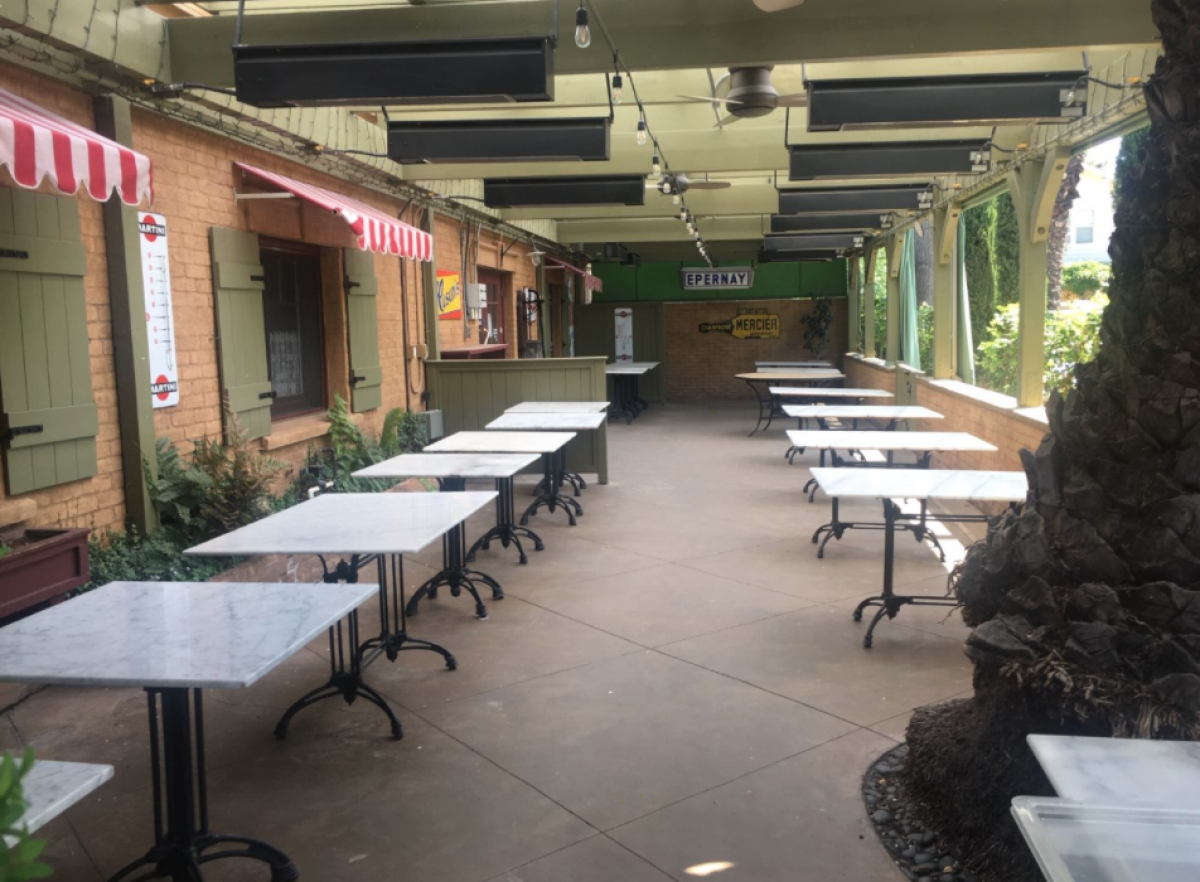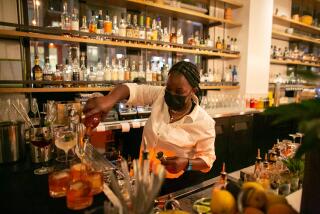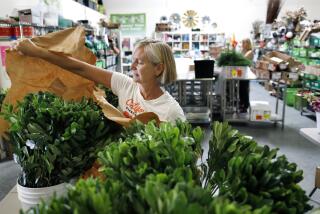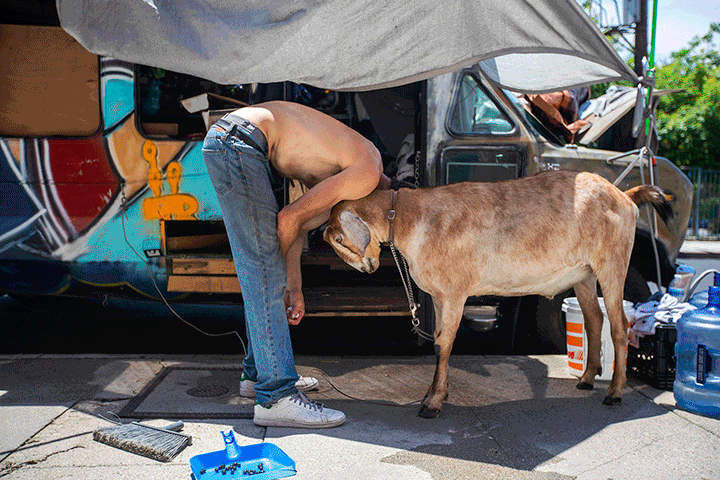California is reopening, but anxious customers are slow to come back

- Share via
NAPA, Calif. — From restaurants to shopping malls, the California economy is grinding back to life after months of coronavirus closures.
But one question looms over the reopening cheers: Do consumers feel safe enough to come back?
California should know the answer soon enough.
After Gov. Gavin Newsom eased the criteria for reopening retail businesses and restaurants, many smaller counties are already turning on the “open” signs while larger counties like Orange and San Diego hope to join them in the coming days. So far, most of California’s 58 counties have applied to move further into the second phase of Newsom’s reopening plan, which allows retail shopping and restaurants to serve in-person patrons.
Yet the experiences of counties that reopened in recent weeks has been sobering. Even as customers are returning, business are hindered by the constraints of operating at reduced capacity to meet social distancing requirements and question whether that model of fewer customers can be sustainable in the long term.
Napa on Wednesday became the first county in the Bay Area to reopen restaurants for in-house dining. But customer traffic was light, and some restaurateurs worried that customers might still be too afraid to come back.
Mauro Pando, owner of Grace’s Table in downtown Napa, began offering customers the opportunity to dine inside in the morning, but few patrons wanted to be seated.
“Confidence is something we need to build in the community,” Pando said, wearing a mask and standing at the restaurant’s entrance. “It will be a slow return.”
To keep patrons six feet apart, he removed 17 tables and their chairs. The restaurant is also using paper napkins and paper menus.
“I feel safe, and I don’t feel nervous,” he said.
But Johanna Hill, a waitress wearing a black cloth mask, confessed she was “a little bit” scared.
Indeed, many people out on the downtown Napa sidewalks Wednesday did not wear masks.
Several small-scale shopping malls that have reopened have seen steady foot traffic. Shoppers eager to browse the Chico Mall in Butte County and the Yuba Sutter Mall in Yuba City must now wait outside store entrances to respect new capacity limits. Shops may hold off on placing a returned item back on a shelf until it has been sanitized or 24 hours have passed.
“People are shopping,” said Natasha Shelton, the senior general manager for both malls. “The feedback from our shoppers is that they are very excited to get back to a sense of normalcy. They are treating themselves to a nice set of shoes or some other item they’ve been used to, to boost their mood. This is something they treasured before and they’re treasuring it even more now.”
But for now, fitting rooms remain closed and only about half of the stores at the two malls are taking customers. Shelton said some national chains are waiting to reopen all of their outlets within a geographic region at once, while other companies are still developing their own health guidelines and getting personal protective equipment in order.
Unlike Napa County, Yuba and Sutter counties have allowed in-person dining and the reopening of a wide range of businesses for several weeks under local guidance.
Yuba City Mayor Shon Harris said he did not hesitate before deciding to eat breakfast at Linda’s Soda Bar and Grill on a recent morning with his 10-year-old son. They wore masks on the way there, which they removed once inside to eat a Spanish omelet and French toast. Both applied hand sanitizer before, during and after the meal.
“It’s a sense of relief,” said Harris. “People are happy to get outside. People are happy to support our businesses. You have a sense of community in some way [like], ‘Hey, we got this.’”
That atmosphere has also been true at Cool Hand Luke’s steakhouse in Yuba City. Staff have their temperatures checked before they start working and restrooms are sanitized every 30 minutes.
On its reopening day, about 175 people dined in.
“Everyone has been waiting to leave their house,” said owner Jesse Villicana. “I think a lot of people were happy we were open and have prime ribs.”
Despite the demand, Villicana has hired only half his staff back because the restaurant has been forced to run at diminished capacity to ensure social distancing.
“If we keep running like this too long, it’s just not going to work,” he said.
Hair salons that reopened under a local public health order in Yuba and Sutter counties have seen an overwhelming demand from customers — both local and from out of town — and even the ones that haven’t done so yet sense that their services will be snatched up.
Shelby Massey, the owner of Studio 622 Salon & Spa in Yuba City, decided to stay closed because she fears pushback from the California Board of Barbering and Cosmetology. She receives calls every day from potential clients and has a lengthy waiting list— with nail services booked until almost July.
“It’s a very tough situation,” Massey said. “I have pressure from people wanting to go back to work, clients wanting to come in and see their stylists, and state officials and the licensing board to stay closed.”
Zoey Hunter Vick, who helps run the Heart n Soul Tattoo parlor in Yuba City with her brother, said that after the county allowed tattoo shops to reopen, the business took a couple of extra days to review its safety protocols. The shop closes each afternoon for an hour so that employees can clean it as thoroughly as if they were reopening for the next day.
So far, Vick said, the parlor has been busy, with more than 20 customers a day. But it received almost twice as many clients before the pandemic.
One of her first appointments was with a local who had been waiting to get a tattoo of a tree on his forearm to memorialize his mother, who had died recently.
“I cleared my schedule to make sure he could come in on Mother’s Day,” she said. “He waited through all of this to have that for himself.”
For small businesses, the shutdown has taken a brutal economic toll. And many business owners said they would gladly accept fewer customers — at least in the beginning — if it meant getting cash flowing again.
Unlike some gyms that offer virtual classes via Zoom or Facebook Live, Evelyn Guzman’s Pilates studio in the city of Orange was completely shut down for two months. Guzman and her husband dipped into their savings to support themselves and their five children, but their landlord wasn’t willing to give them a break on the $2,800 monthly studio rent.
“It started to really hurt us,” Guzman said. “We have rent to pay. We have bills to pay. It’s our livelihood.”
A week before she reopened Bare Fitness OC on Monday, Guzman noticed smaller private training facilities around the county opening their doors to the public. She planned to cut classes in half to about five a day and disinfect all the machines after every use.
Although Guzman said she thinks she is following the law because hers is a private fitness studio, a spokeswoman for Orange County said she was not aware of an exemption for private training facilities and that the county is following state laws. California’s stay-at-home orders classify gyms and fitness studios as higher-risk businesses, which will be allowed to reopen later on in the state’s recovery plan.
About 80 of Guzman’s estimated 320 clients have returned. Others are waiting a bit longer, promising to come back sometime in June.
“Everyone has complained about gaining weight … getting depressed,” Guzman said.
Dolan reported from Napa, Miller from Los Angeles and Carcamo from Orange County. Luke Money in Los Angeles and Anh Do in Orange County contributed to this report.
More to Read
Sign up for Essential California
The most important California stories and recommendations in your inbox every morning.
You may occasionally receive promotional content from the Los Angeles Times.













